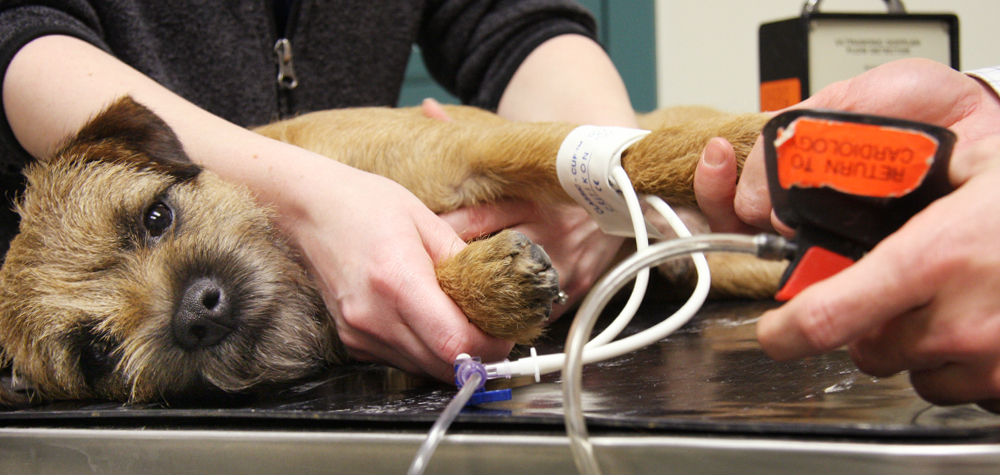Exploring the Essential Solutions Provided by a Veterinary Cardiologist: Comprehending Ultrasound and CT Scan Strategies
Vet cardiologists play a crucial function in the health and wellness of animals by identifying and treating numerous heart problems. They utilize innovative imaging strategies, such as heart ultrasound and CT scans, to supply accurate evaluations. Each approach has its distinct benefits and applications. Comprehending these techniques is necessary for animal proprietors seeking the best look after their companions. What variables should animal proprietors consider when selecting in between these diagnostic devices?

The Role of Vet Cardiologists in Pet Healthcare
Vet cardiologists play an essential function in the health care of pet dogs, focusing specifically on diagnosing and treating heart-related conditions. They possess specialized training that enables them to interpret complicated analysis tests and identify various cardiovascular issues. These professionals utilize advanced methods, such as echocardiography and electrocardiography, to examine heart feature and framework accurately.Veterinary cardiologists likewise establish tailored treatment plans that may include medications, lifestyle adjustments, and, in some situations, medical interventions. Their experience expands to educating animal owners about heart wellness, stressing the relevance of normal examinations and early detection of potential problems. Cooperation with basic veterinarians is important, as it guarantees thorough look after family pets with believed heart problems. By providing specialized services, vet cardiologists considerably improve the lifestyle for pet dogs and give satisfaction for their proprietors, strengthening the significance of heart wellness in general animal health.
Typical Cardiac Issues in Family Pets
Common heart issues in pet dogs can considerably influence their health and wellness and quality of life. Heart whisperings, numerous kinds of cardiomyopathy, and congenital heart issues are amongst one of the most common conditions that vets come across. Board Certified Veterinary Cardiologist. Recognizing these problems is important for pet dog owners to ensure prompt diagnosis and ideal therapy
Heart Murmurs in Pets
Heart murmurs can be a resource of concern for pet dog owners, they are not always indicative of severe health issues. A heart murmur is an irregular audio generated by rough blood flow within the heart. In family pets, these whisperings can be triggered by different aspects, consisting of congenital heart problems, shutoff issues, or also anxiety throughout examinations. Numerous family pets with heart whisperings lead regular lives without substantial health effects. To establish the underlying cause, vet cardiologists often utilize diagnostic methods such as echocardiograms and Doppler ultrasounds. Early discovery and assessment are important, as they may assist handle any kind of possible heart concerns properly. Pet dog owners are encouraged to consult their veterinarian for a comprehensive assessment if a heart murmur is discovered.
Cardiomyopathy Kind Explained
Cardiomyopathy includes a group of illness impacting the heart muscle mass, resulting in jeopardized cardiac feature in family pets. One of the most usual types include expanded cardiomyopathy (DCM), hypertrophic cardiomyopathy (HCM), and limiting cardiomyopathy (RCM) DCM largely impacts pets, creating the heart to deteriorate and expand, which diminishes its ability to pump blood properly. In comparison, HCM is extra common in felines, characterized by the enlarging of the heart wall surfaces, usually leading to blocked blood flow. RCM, though much less typical, happens when the heart muscle becomes rigid, limiting its capability to load with blood. Each type offers distinct challenges in diagnosis and treatment, necessitating specialized veterinary cardiological analysis to guarantee peak administration and look after impacted animals.
Congenital Heart Problems
Genetic heart flaws stand for a substantial category of cardiac concerns in family pets, distinctive from obtained conditions such as cardiomyopathy - Board Certified Veterinary Cardiologist. These issues are structural irregularities existing at birth, affecting the heart's typical feature. Common types consist of license ductus arteriosus, ventricular septal defects, and pulmonic stenosis. Signs might vary extensively, varying from light to extreme, and can consist of workout intolerance, coughing, and problem breathing. Early medical diagnosis with innovative imaging techniques like ultrasound is essential for reliable monitoring. Vet cardiologists play an important duty in identifying these conditions and suggesting proper treatment choices, which might include medical management or surgical treatment. Acknowledging genetic heart issues enables much better results and improved quality of life for influenced pet dogs
Understanding Cardiac Ultrasound: Exactly How It Works
A substantial number of vet methods now use heart ultrasound as an essential diagnostic tool for examining heart health and wellness in animals. This non-invasive strategy uses high-frequency acoustic waves to develop pictures of the heart's structure and feature. Throughout the procedure, a veterinary specialist applies a gel to the animal's chest and uses a transducer to send out ultrasound waves. These waves jump off the heart and surrounding frameworks, generating real-time photos on a monitor.Veterinarians can evaluate numerous elements of heart health and wellness, including chamber size, wall surface activity, and shutoff feature. In addition, cardiac ultrasound permits the discovery of irregularities such as fluid accumulation and congenital heart defects. This strategy is important for detecting problems that may not be visible via basic radiographs. By offering in-depth information regarding the heart's composition and performance, heart ultrasound help in developing effective treatment plans for pets enduring from cardiovascular disease.
The Relevance of CT Checks in Detecting Heart Conditions
Exactly how do CT scans improve the diagnosis of heart disease in vet medication? CT scans offer in-depth his comment is here cross-sectional pictures of the heart and surrounding frameworks, permitting veterinarians to envision complicated anatomical relationships. This imaging technique is particularly useful in recognizing hereditary heart defects, cardiac lumps, and abnormalities in blood vessels. By making use of innovative imaging algorithms, CT scans can examine heart chamber dimensions and function, using a thorough view that may be difficult to attain with traditional methods.Additionally, CT angiography can picture blood flow and determine areas of constriction or obstruction, which is vital for planning potential treatments. The speed and accuracy of CT scans additionally assist in quick medical click here for more diagnoses, vital in emergency situation circumstances. Ultimately, the unification of CT checks right into veterinary cardiology considerably boosts the precision of diagnoses, enabling targeted treatment plans and enhancing patient outcomes for animals struggling with heart conditions.
Comparing Ultrasound and CT Check Techniques
While both ultrasound and CT scans are invaluable tools in veterinary cardiology, they use unique benefits and limitations that influence their usage in detecting heart disease. Ultrasound, or echocardiography, offers real-time imaging of the heart's structure and feature, allowing veterinarians to evaluate heart chambers, valves, and blood circulation. It is particularly efficient for reviewing conditions like coronary infarction and cardiomyopathy. Nevertheless, ultrasound may be limited in imagining particular anatomical structures due to individual size or obesity.In comparison, CT scans offer comprehensive cross-sectional pictures of the heart and bordering tissues, making them perfect for determining architectural problems, growths, or vascular problems. Although CT scans supply detailed understandings, they call for sedation and might entail radiation direct exposure. Eventually, the option between ultrasound and CT scans relies on the details scientific situation, the client's condition, and the information required for an exact medical diagnosis.
Therapy Alternatives Readily Available With Veterinary Cardiology
Veterinary cardiology supplies a variety of treatment alternatives tailored to address numerous heart disease in animals. Therapy plans often start with lifestyle alterations, consisting of diet plan changes and workout modifications, aimed at boosting overall heart health. Medicines play a vital duty, with cardiologists suggesting medications such as diuretics, beta-blockers, and ACE inhibitors to enhance and take care of symptoms heart function.In more serious instances, interventional procedures, such as balloon valvuloplasty or stent positioning, might be necessary to relieve obstructions or boost blood flow. For sure hereditary heart issues, surgical alternatives may be discovered to fix architectural issues. In addition, ongoing tracking and follow-up treatment are important parts of a detailed treatment strategy, allowing for timely changes based on the animal's feedback to therapy. Overall, vet cardiology concentrates on offering reliable, customized care to enhance the wellness and health of animal individuals with heart disease.
How to Prepare Your Pet Dog for a Heart Evaluation
Preparing an animal for a cardiac examination is necessary to guarantee accurate results and a smooth process. Owners need to initially schedule the appointment with the veterinary cardiologist and discuss any kind of specific requirements or issues. It is suggested to hold back food for at least 12 hours prior to the evaluation, as this assists boost imaging top quality during treatments like ultrasound or CT scans.Additionally, keeping a tranquil setting on the day of the consultation can help in reducing the pet dog's anxiousness. It is useful to bring along any relevant clinical documents, including previous examinations and medicines (Board Certified Veterinary Cardiologist). Owners need to also make certain that their pet is comfy and leashed throughout transportation to the center. Lastly, familiarizing themselves with the assessment process can alleviate worries and aid in asking notified concerns during the assessment. By complying with these steps, proprietors can add considerably to the effectiveness of the heart assessment
Frequently Asked Concerns
How Lengthy Does a Cardiac Ultrasound or CT Check Take?
The duration of a heart ultrasound usually ranges from 30 to 60 mins, while a CT scan might take roughly 15 to thirty minutes. Elements such as the client's problem can influence these time quotes.

Exist Any Kind Of Risks Connected With These Diagnostic Procedures?

Can I Remain With My Pet Dog Throughout the Treatment?
The veterinary facility's plan usually determines whether pet owners can remain during procedures. While some clinics motivate proprietor visibility for convenience, others might need separation to ensure security and suitable problems for analysis imaging.
Just how much Do These Analysis Examinations Usually Expense?
The expenses of analysis examinations, such as ultrasound and CT scans, usually differ based upon area and center. Typically, prices range from a few hundred to over a thousand dollars, reflecting the intricacy and technology involved.
What Is the Recovery Process After a Cardiac Evaluation?
The recovery process after a heart evaluation entails checking the family pet for any prompt responses, making sure comfort, and restricting physical task. Veterinarians generally provide post-evaluation instructions to guide pet dog proprietors during this vital healing period. Heart whisperings, numerous kinds of cardiomyopathy, and hereditary heart defects are amongst the most widespread conditions Check This Out that veterinarians experience. A heart whispering is an irregular sound created by turbulent blood circulation within the heart. Cardiomyopathy incorporates a team of diseases influencing the heart muscle, leading to endangered cardiac feature in pets. Genetic heart problems represent a substantial classification of cardiac concerns in family pets, distinctive from acquired conditions such as cardiomyopathy. Ultrasound, or echocardiography, provides real-time imaging of the heart's structure and feature, allowing vets to evaluate heart chambers, valves, and blood circulation.